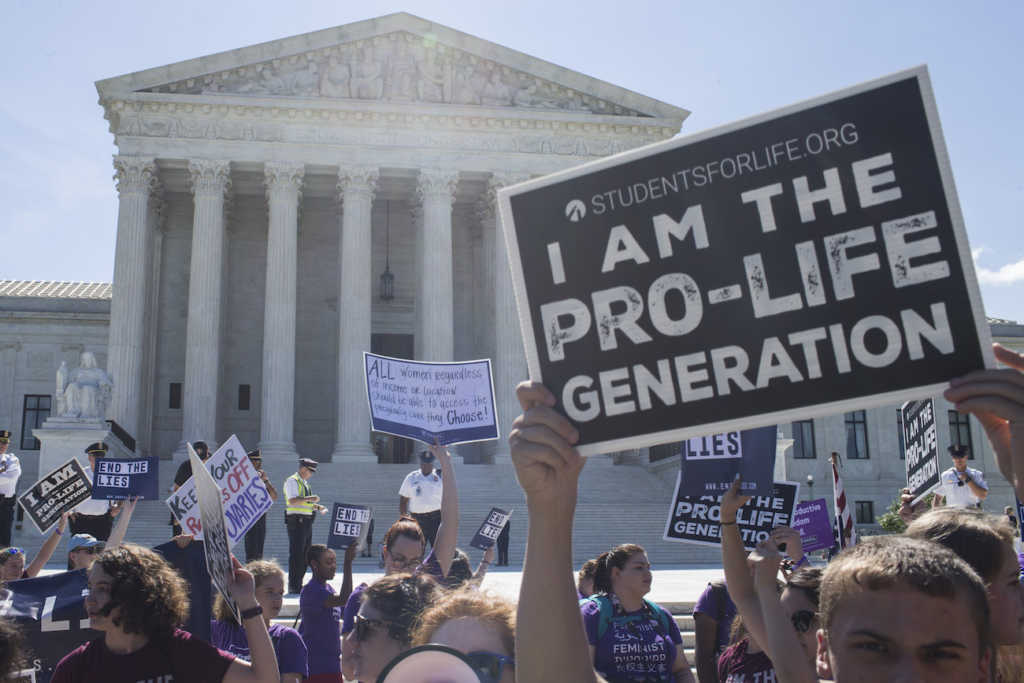Christian leaders are rejoicing after the U.S. Supreme Court ruled Tuesday it is unconstitutional for crisis pregnancy centers to be forced to advertise where women can obtain free or low-cost abortions.
The 5-4 decision, written by Justice Clarence Thomas, came after the National Institute of Family and Life Advocates (NIFLA), a public interest law firm that advises pregnancy centers, filed a legal challenge against the Reproductive FACT Act.
The legislation, passed into law in 2015, required pregnancy centers — many of which are operated by Christian organizations — to post signs in “conspicuous” locations informing visitors where abortion services are provided.
The signs read as follows:
California has public programs that provide immediate free or low-cost access to comprehensive family planning services (including all FDA-approved methods of contraception), prenatal care, and abortion for eligible women. To determine whether you qualify, contact the county social services office at [insert the telephone number].
Any pro-life pregnancy center that refused to comply with the regulation could be fined $500 for the first offense and $1,000 for every subsequent violation.
In an interview with Fox News, Thomas Glessner, founder and president of NIFLA, described the law as “a brilliant political move” by the state of California, noting it “mandates under law that the pro-life centers are advertising for abortion.”
Mom Refuses to Get Abortion at the LAST SECOND After Hearing These Words
Glessner argued it’s “scandalous that the law allows a multimillion-dollar abortion industry to bully small non-profits.”
“Can the government impose and compel a faith-based ministry to proclaim a message that they are fundamentally opposed to with the risk of being fined or shut down?” he asked.
And according to the high court, the answer to Glessner’s question is, “No.”
NIFLA celebrated the court’s decision Tuesday. Glessner praised the justices who voted in favor of the pregnancy centers, arguing the Constitution guarantees “the right to not be compelled by government to speak a message with which one disagrees and which violates one’s conscience.”
Other Christian leaders weighed in on the victory, too:
“The court affirmed the freedom of speech, freedom of expression, that the state can't force pro-life organizations to participate in abortion.” –@drmoore #NIFLA #SCOTUS pic.twitter.com/q9lf0xUklC
— ERLC (@ERLC) June 26, 2018
https://twitter.com/andrewtwalk/status/1011612507918753792
It’s a great day for free speech, religious liberty and the pro-life movement. Perhaps laws like the one at the center of this case will fall out of favor in the pro-abortion camp because of the #scotus stance today. #NIFLAvBecerra #NIFLA #FreeSpeech pic.twitter.com/XLZrMc83kh
— Frank Pavone (@frfrankpavone) June 26, 2018
Thank you #SCOTUS for giving us a reason to celebrate! @jeannemfl @NIFLA #givefreespeechlife #niflavbecerra pic.twitter.com/m2esMI25Fy
— March for Life (@March_for_Life) June 26, 2018
California declared that any organization dealing with pregnant women must promote abortion. Theyre not allowed to operate under the belief that abortion is objectively bad and harmful. That was California's law. AND FOUR SUPREME COURT JUSTICES AGREED WITH IT.
— Matt Walsh (@MattWalshBlog) June 26, 2018
Thomas was joined by Chief Justice John Roberts as well as Justices Anthony Kennedy, Samuel Alito, and Neil Gorsuch. Justices Stephen Breyer, Ruth Bader Ginsburg, Sonia Sotomayor, and Elena Kagan dissented.
During oral arguments in March, Alito suggested the law was crafted specifically to target pro-life pregnancy centers. While he said the legislation looks neutral on paper, it contains “a lot of crazy exemptions” that could “infer intentional discrimination.”
School Participates in Repeated Vandalism of Students’ Pro-Life Display
Kennedy, who wrote his own brief concurrence, said the California law “imperils” the freedoms enshrined by the First Amendment — the freedoms of speech and of religion.
“This law is a paradigmatic example of the serious threat presented when government seeks to impose its own message in the place of individual speech, thought, and expression,” he wrote.



